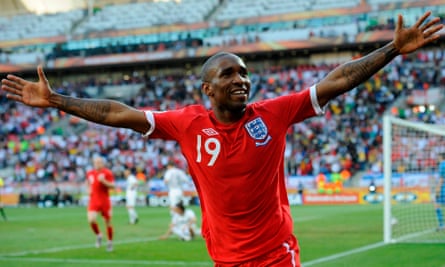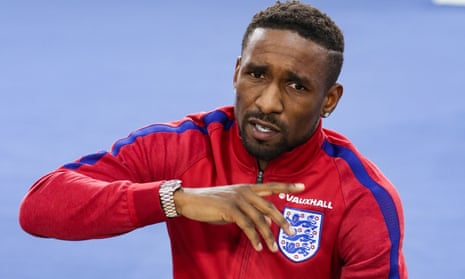Jermain Defoe turned 35 on Saturday, spending his birthday travelling to Lithuania with the England squad he was so happy to rejoin and not even thinking about slowing down, let alone retiring. A French fitness expert whom Ian Wright recommended a few seasons ago said he thought he could add five years to Defoe’s career and the Bournemouth striker reckons he probably has. What Defoe does not know, and is not in too much of a hurry to find out, is whether he has already used up that five-year bonus or still has a fair part of it left.
“I might be 35 but my fitness stats are the same as ever,” he says. “I didn’t know I would reach this age and still be running down the channels like I’m 25, so no, I don’t know how long I can keep going. But if I feel the same at 37, why not carry on? If we were looking at my stats at the age of 25 and they were the same, it wouldn’t even be a question, would it?”
This is a player who left the Premier League to join Toronto in the MLS three years ago, a move widely considered to be a sign of a career being wound down. No one imagined then that another two Premier League clubs and a recall to the national side might be in the offing.
Post Wayne Rooney, Defoe is by a distance the only player in the current squad whose England career overlaps with the manager’s. When he made his debut against Sweden, 13 years and over a half-century of caps ago, Sven-Goran Eriksson sent on Gareth Southgate as a second-half substitute.
That is how long Defoe has been performing at the top level since breaking into the West Ham team around the start of the new millennium. He seems to have enjoyed something of a charmed life, especially in the later stages of his career, yet if so it is one achieved through hard work and constant sacrifice.
The two towering influences on his progress through the professional ranks have been his mother, Sandra, who helped keep him on the straight and narrow when teenage distractions threatened to derail his career, and the former Crystal Palace and Arsenal striker Wright, who took the young forward under his wing at West Ham and seems to have imbued Defoe with some of his own determination to make the most of God-given talent.
“I still love football, even when I’m at home I watch every game, and these days I take an extra interest in the younger lads around the club because that’s what Wrighty did with me,” he says. “When I was at Sunderland, because the academy was based at the training ground, I would often stay behind and watch. I think it’s important to try and help people and give something back if you can.
“Everything Wrighty taught me I never forgot, and he was the one who introduced me to Tiberius [Darau]. I injured my ankle in 2010 after the World Cup, and he told me I needed to see this guy in Cannes. He said: ‘Don’t worry, just go to him,’ so I did. I think he [Darau] had been at Arsenal for a few years before retiring but a lot of players still used him. He was unbelievably good, like an angel to me, and I was upset when he died a couple of years ago. But in the 10 days I was with him he put me through the hardest training I have ever known. I was saying: ‘I don’t know if I can do this,’ and he was saying: ‘Just listen to me, I’m going to put five years on your career.’
“It was only short, sharp stuff but really explosive. In the afternoons I would go back to the hotel and sleep. All I will say is that when I got back Harry Redknapp was amazed. He tried to bring Tiberius over to Tottenham but couldn’t get him, so I just kept nipping over to France every pre-season for a few years. I loved that guy.”
By that stage Defoe was old and wise enough to work out what would be best for his career, though he cheerfully admits that was not always the case. “I grew up on an estate and I didn’t always appreciate the discipline it took to look after myself,” he says.
“I could actually look out of my bedroom window and see all my mates smoking, drinking and talking to girls. I was a young lad too, so of course I wanted some of that, but my mum would keep on at me about making sacrifices. She would say: ‘If you want to be a professional footballer, like you’ve been telling me since you were two years old, then you have to do everything right.’
“That’s in me now. I don’t touch alcohol but sometimes in a restaurant I might fancy a chocolate brownie or something and though it probably wouldn’t even do much harm, I always talk myself out of it. I’m trying to stick to vegan food but it’s a bit of a problem because I love fish.”

Longevity appears to be Defoe’s reward, along with a wholly unexpected chance at another World Cup. He was famously snubbed by Eriksson for the 2006 squad, even though Rooney was coming back from injury and Theo Walcott would not play a game, and though he made it to South Africa in 2010 – “don’t get me started on Frank Lampard’s disallowed goal against Germany” – he missed out on Brazil three years ago when he felt he had done enough to make the trip.
“That’s another thing my mum used to tell me: ‘You have to learn to deal with disappointments and come back stronger,’” he says. “It was tough to get the phone call from Roy [Hodgson] but I wasn’t the only one. Michael Carrick and Ashley Cole were left out too. I had toughened up a little bit by then though, 2006 was much harder because that was the first big disappointment of my career. I wasn’t expecting it, couldn’t understand it and it was hard to take.”
Plenty of England players found Fabio Capello’s boot camp regime in South Africa hard to take as well, though by now it should come as no surprise to discover Defoe was not one of them. “I was too busy living the dream to think of complaining,” he says. “I was like a little kid again. I was at a World Cup and that’s the pinnacle. 23 players in the squad. Four forwards. And I’d made it.
“You do have a lot of free time but you’re there for a reason. I sometimes used to go to the gym in the evenings and quite often Capello would be there. I remember doing pull-ups next to the manager. All I think about World Cups is that I remember watching Italia 90 with my mum and dad, Gazza doing his stuff and Gazzamania when he came back.
“If you have an opportunity to do the same, why would you not want it, even if you might not be making the starting lineup? World Cups are never about the first XI, they are always about the squad. I’ve never stopped thinking that playing for my country is a big deal, I still get the same buzz I always did and I don’t believe it will ever leave me.”

Comments (…)
Sign in or create your Guardian account to join the discussion